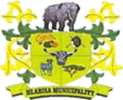Hlabisa Local Municipality
| Hlabisa | ||
|---|---|---|
| Local municipality | ||
| ||
.svg.png) | ||
| Country | South Africa | |
| Province | KwaZulu-Natal | |
| District | uMkhanyakude | |
| Seat | Hlabisa | |
| Wards | 8 | |
| Government[1] | ||
| • Type | Municipal council | |
| • Mayor | Bhekinkosi Ntombela | |
| Area | ||
| • Total | 1,555 km2 (600 sq mi) | |
| Population (2011)[2] | ||
| • Total | 71,925 | |
| • Density | 46/km2 (120/sq mi) | |
| Racial makeup (2011)[2] | ||
| • Black African | 99.4% | |
| • Coloured | 0.1% | |
| • Indian/Asian | 0.2% | |
| • White | 0.1% | |
| First languages (2011)[2] | ||
| • Zulu | 95.0% | |
| • Southern Ndebele | 1.5% | |
| • English | 1.2% | |
| • Other | 2.3% | |
| Time zone | SAST (UTC+2) | |
| Municipal code | KZN274 | |
Hlabisa is an administrative area in the Umkhanyakude District of KwaZulu-Natal in South Africa. Hlabisa is an isiZulu surname of the two nkosis (kings) in the area. The municipality is situated within the vicinity of four Tribal Authorities which are the Mkhwanazi Tribal Authority, the Mdletshe Tribal Authority, and two Hlabisa Tribal Authorities.[3]
The municipality is generally characterised by isolated rural communities with high levels of poverty. The most significant land use is subsistence agriculture and dispersed settlements, plantations and agriculture are found throughout the municipality. The major draw card of Hlabisa is the tourism industry centred on the adjacent game reserve.[4]
Main places
The 2001 census divided the municipality into the following main places:[5]
| Place | Code | Area (km2) | Population |
|---|---|---|---|
| Abakwahlabisa | 53501 | 133.62 | 16,583 |
| Hlabisa | 53502 | 1.14 | 652 |
| Mdletshe | 53503 | 375.17 | 38,851 |
| Mpembeni | 53504 | 114.83 | 10,490 |
| Mpukunyoni | 53505 | 796.90 | 110,299 |
Politics
The municipal council consists of sixteen members elected by mixed-member proportional representation. Eight councillors are elected by first-past-the-post voting in eight wards, while the remaining eight are chosen from party lists so that the total number of party representatives is proportional to the number of votes received. In the election of 18 May 2011 no party obtained a majority. The following table shows the results of the election.[6][7]
The National Freedom Party lost a ward to the Inkatha Freedom Party in a by-election in December 2012. As a result the IFP gained a majority of 9 seats on the council.[8]
| Party | Votes | Seats | ||||||
|---|---|---|---|---|---|---|---|---|
| Ward | List | Total | % | Ward | List | Total | ||
| Inkatha Freedom Party | 8,573 | 8,502 | 17,075 | 46.8 | 6 | 2 | 8 | |
| African National Congress | 5,052 | 5,076 | 10,128 | 27.8 | 1 | 3 | 4 | |
| National Freedom Party | 4,559 | 4,561 | 9,120 | 25.0 | 1 | 3 | 4 | |
| Democratic Alliance | 35 | 90 | 125 | 0.3 | 0 | 0 | 0 | |
| Total | 18,219 | 18,229 | 36,448 | 100.0 | 8 | 8 | 16 | |
| Spoilt votes | 329 | 318 | 647 | |||||
References
- ↑ "Contact list: Executive Mayors". Government Communication & Information System. Retrieved 22 February 2012.
- ↑ 2.0 2.1 2.2 "Local Municipality". Statistics South Africa. Retrieved 11 September 2013.
- ↑ South African Languages - Place names
- ↑ KwaZulu-Natal Top Business - Hlabisa Municipality
- ↑ Lookup Tables - Statistics South Africa
- ↑ "Results Summary – All Ballots: Hlabisa". Independent Electoral Commission. Retrieved 3 December 2013.
- ↑ "Seat Calculation Detail: Hlabisa". Independent Electoral Commission. Retrieved 3 December 2013.
- ↑ http://www.politicsweb.co.za/politicsweb/view/politicsweb/en/page71654?oid=345549&sn=Detail&pid=71616
External links
| |||||||||||||||||||||||||||||||||||||||||||
Coordinates: 28°08′S 31°52′E / 28.133°S 31.867°E

.svg.png)